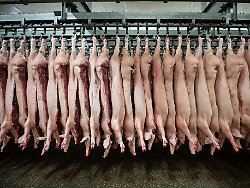Thursday, April 8th, 2021
After Aus for work contracts
Conditions in the meat industry are only partly better
Contracts for workers in the meat industry have been criticized for years – among other things because of low wages and cramped accommodation for workers from abroad. Only the corona pandemic causes a change. However, the problems have not been solved everywhere.
A quarter of a year after the termination of factory employment relationships in the core areas of the slaughterhouse and meat industry, the conclusion from the union’s point of view is mixed. Some companies already hired the manual workers as their own employees last year, said Szabolcs Sepsi from the DGB advice center “Fair Mobility” in Dortmund: “Of course, this does not change the management culture or the way people deal with people overnight.” Overall, one speaks of many tens of thousands of people who have been taken over.
The practice that had been common for many years that the core work in the slaughterhouses and cutting plants was not performed by permanent employees but by Eastern European workers was ended by the federal government at the end of last year. The trigger was large corona infection outbreaks among the workforce, for example at the market leader Tönnies.
According to Sepsi, the living situation is still a big problem – he still hears that sometimes six people are accommodated in three-room apartments and each has to pay 190 to 200 euros a month. However, the big companies have started programs to improve the situation.
Wrestling for collective agreements
A big topic among the employees is the so far unsuccessful negotiations about a collective agreement for the employees. “That was also an issue in the press in Romania,” said Sepsi. The demand for a minimum hourly wage of 12.50 euros and 17 euros for skilled workers is shared by the people. The employers’ offer of an hourly wage of 10.50 euros without a skilled worker wage disappointed the people. From the employers’ point of view, the union proposals were “unrealistic and threatened to exist”.
The actual earnings in the companies differ widely in the workforce because production itself is heavily divided between labor, explained Sepsi. For simple dismantling and packaging activities on the assembly lines, little more than the minimum wage is paid. On the other hand, there are highly qualified and sought-after specialists who boning and cutting up the animals. These would come thanks to allowances on gross wages between 3,000 and 4,000 euros a month, said Sepsi.
Thousands of workers taken on
The Westfleisch cooperative points out that around 3,000 new employees were hired by the end of 2020 on the basis of a collective agreement negotiated with the NGG union. Less than 20 percent of the total of around 7,000 employees in slaughtering and cutting are classified in the lowest wage group, but receive more than the minimum wage.
The German slaughterhouse market leader Tönnies took over 6,000 workers at the turn of the year, said a company spokesman. More than 70 percent of the employees lived privately. For the remaining 30 percent, Tönnies took over the living space management. For this purpose, more than 700 apartments and houses have been bought or rented, creating more than 3800 residential spaces.
The Dutch battle company Vion took over 3,300 former workers at the turn of the year, said a company spokesman. The accommodations taken over by the service contractors had been checked – around ten percent had not met the desired standards. Some of them have been renovated, but at the same time it is being examined whether the company wants to build accommodation itself or take over vacant hotels.
.
